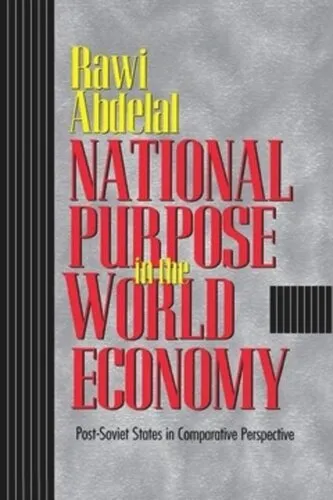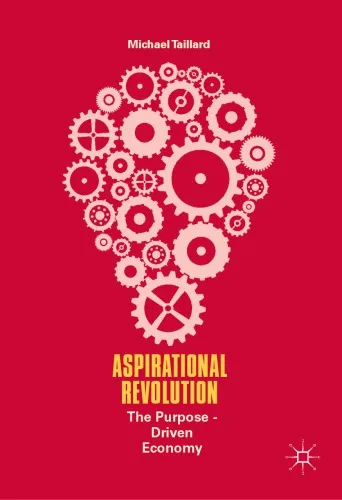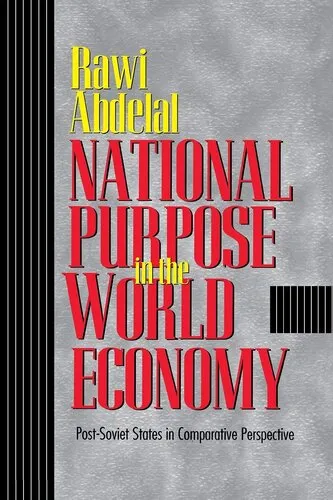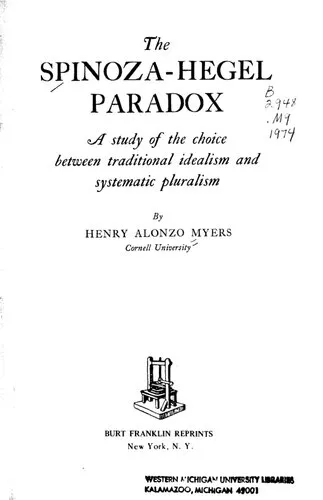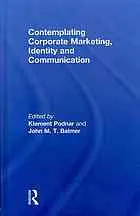National Purpose in the World Economy: Post-Soviet States in Comparative Perspective
4.0
بر اساس نظر کاربران

شما میتونید سوالاتتون در باره کتاب رو از هوش مصنوعیش بعد از ورود بپرسید
هر دانلود یا پرسش از هوش مصنوعی 2 امتیاز لازم دارد، برای بدست آوردن امتیاز رایگان، به صفحه ی راهنمای امتیازات سر بزنید و یک سری کار ارزشمند انجام بدینکتاب های مرتبط:
مقدمهای بر کتاب "National Purpose in the World Economy: Post-Soviet States in Comparative Perspective"
کتاب "National Purpose in the World Economy: Post-Soviet States in Comparative Perspective" نوشته 'راوی عبدالال' به تحلیل عمیق و جامعی از وضعیت اقتصادی و سیاسی کشورهای پساشوروی در دنیای امروز میپردازد. این کتاب با بررسی و مقایسه بین این کشورها و دیگر اقتصادهای جهان، نگاهی موشکافانه به اهداف ملی و نقش آنها در اقتصاد جهانی میاندازد. در ادامه به تفصیل به بررسی بخشهای مختلف این کتاب میپردازیم.
خلاصهای از کتاب
این اثر به بررسی نقاط مشترک و تفاوتهای اقتصادی و سیاسی بین کشورهای پساشوروی و دیگر کشورهای جهان میپردازد. نویسنده با استناد به دادههای تاریخی و تحلیلی، نقش اقتصاد و سیاست ملی در چگونگی شکلگیری یک هویت ملی پس از فروپاشی اتحاد جماهیر شوروی را بررسی میکند. با تأکید بر مفهوم "National Purpose"، کتاب نشان میدهد که چگونه این هدف ملی میتواند در اقتصاد بینالمللی تأثیرگذار باشد.
نکات کلیدی
- نقش اهداف ملی در شکلدهی سیاستهای اقتصادی.
- تفاوتها و شباهتهای اقتصادی بین کشورهای پساشوروی.
- راهکارهای تقویت اقتصاد ملی در محیط بینالمللی.
جملات مشهور کتاب
«درک صحیح از هدف ملی یک کشور میتواند نه تنها در سیاستهای داخلی بلکه در تعاملات بینالمللی آن نیز تأثیرگذار باشد.»
«تاریخ اقتصادی یک کشور، کلیدی است برای درک آینده آن در اقتصاد جهانی.»
اهمیت این کتاب
این کتاب برای محققین و دانشپژوهانی که به دنبال درک عمیقتر از روابط بینالمللی و اقتصاد سیاسی هستند، بسیار ارزشمند است. با نگاهی به چالشها و فرصتهای اقتصادی کشورهای پساشوروی، این کتاب به سیاستگذاران و اقتصاددانان بینشهای مفیدی ارائه میدهد که میتوانند در تدوین سیاستهای ملی و بینالمللی به کار آیند. از آنجا که این کشورها نقش مهمی در معادلات سیاسی و اقتصادی بینالمللی ایفا میکنند، فهم بهتر از دینامیکهای داخلی و خارجی آنها میتواند به ایجاد یک دنیای پایدارتر و تعاملپذیرتر کمک کند.
Introduction
Welcome to National Purpose in the World Economy: Post-Soviet States in Comparative Perspective, a profound exploration of the economic and political transformation of post-Soviet states. This book delves into the complexities of national identities and economic strategies as countries from the former Soviet Union navigate their paths in the global arena. Rich with analysis and insight, this work offers a comparative perspective on the diverse trajectories of these nations.
Detailed Summary of the Book
The dissolution of the Soviet Union led to the emergence of fifteen independent states, each grappling with the inherited Soviet economic structure and the newfound necessity to establish individual national identities. The book discusses how these post-Soviet states have prioritized national purposes differently, influencing their strategies in engaging with the world economy.
By employing a comparative lens, the book examines the distinct paths taken by these states, categorizing them into various groups based on their economic strategies and national objectives. Some countries, like the Baltic states, swiftly integrated into Western economic and political systems, while others, such as Belarus, adopted more insular policies. The author analyzes how these choices were shaped by internal factors like political leadership, historical experiences, and societal values, as well as external influences, including regional geopolitics and global economic trends.
The narrative also highlights specific case studies to illustrate the diverse experiences of post-Soviet states. From the resource-rich economies of Kazakhstan and Azerbaijan to the more diversified economies of Ukraine and Georgia, the text provides a comprehensive account of the varying economic policies and their outcomes.
Key Takeaways
- The legacy of the Soviet system continues to influence economic and political decisions in post-Soviet states.
- National identity plays a crucial role in shaping economic strategies and international alignments.
- Diversification of the economy is critical for stability and growth in post-Soviet states.
- Different historical trajectories and external pressures have led to varied economic models in the region.
Famous Quotes from the Book
"Economic strategies are not just reflections of material interests but are deeply intertwined with national identities and historical narratives."
"The diverse responses of post-Soviet states to the challenges of globalization reveal the enduring power of national purpose."
Why This Book Matters
Understanding the economic and political trajectories of post-Soviet states is crucial for several reasons. Firstly, these countries occupy strategic positions in global geopolitics, influencing regional stability and international relations. Secondly, their economic practices offer unique insights into the possibilities and pitfalls of transitioning from a centrally planned economy to a market-oriented system.
This book is essential for scholars, policymakers, and anyone interested in the broader implications of national purpose in the world economy. By providing a detailed comparative perspective, it enriches our understanding of how nations reconstruct their economies and identities in the aftermath of profound systemic change. Its in-depth analysis and case studies make it a vital resource for analyzing not just the past and present but also the future directions of these dynamic and often unpredictable states.
دانلود رایگان مستقیم
شما میتونید سوالاتتون در باره کتاب رو از هوش مصنوعیش بعد از ورود بپرسید
دسترسی به کتابها از طریق پلتفرمهای قانونی و کتابخانههای عمومی نه تنها از حقوق نویسندگان و ناشران حمایت میکند، بلکه به پایداری فرهنگ کتابخوانی نیز کمک میرساند. پیش از دانلود، لحظهای به بررسی این گزینهها فکر کنید.
این کتاب رو در پلتفرم های دیگه ببینید
WorldCat به شما کمک میکنه تا کتاب ها رو در کتابخانه های سراسر دنیا پیدا کنید
امتیازها، نظرات تخصصی و صحبت ها درباره کتاب را در Goodreads ببینید
کتابهای کمیاب یا دست دوم را در AbeBooks پیدا کنید و بخرید
1444
بازدید4.0
امتیاز0
نظر98%
رضایتنظرات:
4.0
بر اساس 0 نظر کاربران
Questions & Answers
Ask questions about this book or help others by answering
No questions yet. Be the first to ask!
